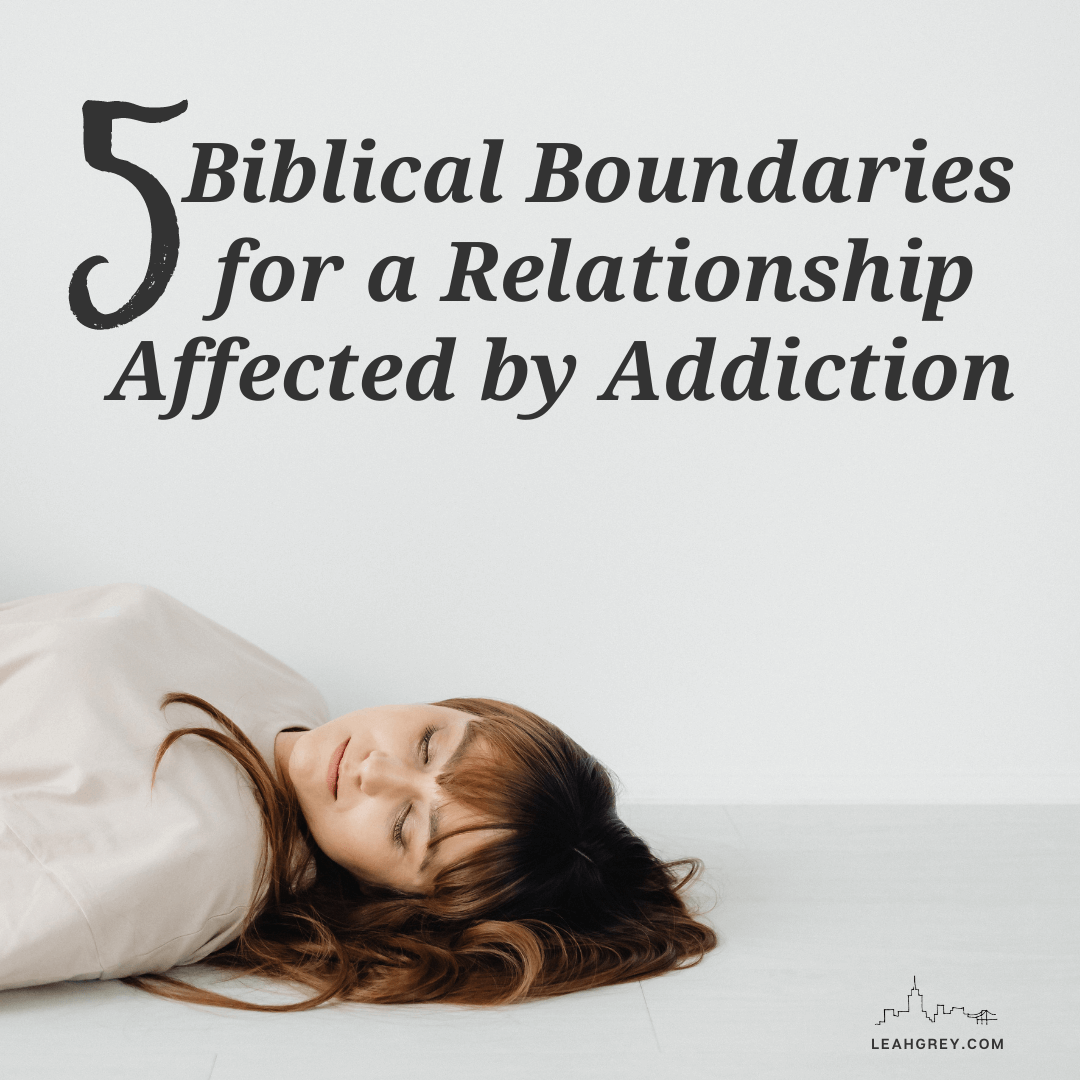How to Have a Healthy Relationship in Addiction Recovery
Living with a loved one in recovery is an entirely different thing than life in active addiction. Each season needs its own specific course of action and entirely different approach.
When our loved ones are in active addiction everything from finances to their whereabouts is in question; "Who are they with? What are they doing? Why are they late? Who are they on the phone with? Why did they take their phone in the bathroom?"
When our loved ones move into recovery, we often don’t move with them. We stay stuck in the addiction -for good reason! With so many breaks in trust, tainted family memories and difficult nights we spent trying not to lose our minds, transitioning into recovery is not an easy switch for our bruised hearts to make.
In my own experience, I have felt the pressure from my husband, his friends, family, counselors and especially from pastors (yes- they gave the most pressure) to view my husband as “in recovery”. Start new. Try to trust. Have faith!
And I've done it. I buckled under the pressure and gave chances despite the fact that my instincts screamed, “Not yet!”.
It wasn’t that I didn’t still have boundaries because I did. It was that I made the mistake of resuming the relationship before I forgave my husband.
We cannot resume the relationship before we forgive!
In retrospect, I was not ready to reconcile because I was still hurt. That hurt led me to buckle easily under pressure, react quickly to fear and lash out in anger over each injustice. The truth is, we cannot heal a relationship while we’re still wallowing in the pain. Yet with all the wise counsel I received, I only once was told to work on forgiving my husband before we resumed our relationship.
“Forgiveness is not reconciliation” is a common teaching. Reconciliation simply means to be amicable [Source]. Reconciling our differences is good! To live peacefully and be in harmony is Godly and important. But resuming a relationship, well, that's an entirely different thing.
In all forms of relationships, we can live harmoniously (in a “truce” so to speak) without having a close relationship. When it comes to our loved ones, we often attempt to restore the intimacy in the relationship before both forgiveness and reconciliation have happened.
I have learned through much trial and error that only when the pain of what happened doesn’t hurt us anymore and we are able to coexist in peaceful harmony with our loved ones, are we ready to resume the relationship- if both parties want to.
7 Points on Forgiveness
Forgiveness is not for them- it’s for us.
We don’t need an apology to forgive someone.
They don’t need to be sorry.
We can forgive someone who doesn’t even recognize they hurt us.
Forgiveness is acknowledging the pain we’re carrying and saying we don’t want to carry it anymore.
Forgiveness doesn’t mean what happened was okay, it means we won’t allow it to hurt us anymore.
Forgiveness takes time.
If we restore a relationship with a loved one in recovery without first forgiving them, the negative patterns in our relationship are doomed to repeat themselves. I would bet that if you think back, you can see times this has happened in your own story!
How to Forgive Someone We Feel Doesn't Deserve Forgiveness
1. Know that no one deserves forgiveness but Jesus made forgiveness free for all.
As believers in Christ, we are called to forgive those who hurt us. This is part of showing the love of God. Because forgiveness has been given to us we have to give it to others or forego our own forgiveness.
Harsh, but true.
2. Recognize the pain driving your loved one.
As idealistic as it may sound, there is always a pain behind any addiction whether it be an undiagnosed mental illness, history of trauma or something deeply missing in their soul. Again, this doesn’t make what they have done “okay” but seeing someone else’s pain does help us heal our own anger.
Compassion and empathy are great tools for forgiveness!
3. Remember forgiveness frees us from allowing Satan to puppeteer our thoughts and emotions.
Have you ever heard the term “spiritual foothold”? It basically means that there is an area in our minds Satan has taken captive. Like Achille’s heel, in our weakness, he feeds us bitter or painful thoughts, plants seeds of self-doubt and causes confusion. When allowed too long, this foothold can become very destructive.
Have you ever been in a relationship where all of a sudden, something about the other person starts to drive you nuts? Their weird toe, the way they chew their foot or that extra few rolls they have round their middle. Suddenly, it’s all you can focus on. Every time you look at them all you can see is that irritating, semi-repulsive quality. Love blinds us to those things.
A foothold from the enemy works in much the same way except that it magnifies a lie: Our loved one works late and we begin to believe they’re being unfaithful. We cannot see the pain driving their addiction only the way it’s ruining our lives. Our children are fine now but we become certain that one day they’re going to turn into drug-dealing, STD-carrying, reckless high school dropouts because of all of this- we need to save them now!
Satan loves to “sound the alarm” before the fire. Forgiveness allows us to focus on what it real instead of what destructive things could happen.
4. Accept the reality of your life.
Our lives have not been easy. We do not have the reliable, honest, Christian child or husband that Suzy-Q has from church. We have made mistakes and errors in judgment to get to where we are today. There is nothing we can do to stop our loved one from engaging in their addiction. There is nothing we could have done to stop them from becoming addicted. We cannot change that we have been hurt. No future choice will make their addiction any easier to bear.
This is the reality of addiction.
We are entitled to grieve. We are allowed to be angry. We can be both grieving and angry at the same time. Suffering does not take away from how much we love them or how much God loves us. It is simply an unfortunate part of living in a fallen world; A, “Series of Unfortunate Events,” if you will.
5. Work to stop giving in to angry reactions.
Anger is either protective or fear-based. When we react in anger to someone it’s our memory telling us something about our deep-seeded needs. This is important for us to remember! But what we cannot do is continue to remember the offense. If we want to stop being angry, the memory of the offense must fade. It doesn’t mean we will fully forget or trust will be magically restored but it’s important to choose to move on or we will always feel a rise in anger to protect ourselves or in reaction to fear.
Being angry and giving in to angry reactions are two different things. The Bible teaches extensively on how God wants us to behave when we are angry (notice, I didn’t say how to not BE angry).
“A fool does not think before he unleashes his temper, but a wise man holds back and remains quiet.”
This is not easy for everyone. It could take time to learn how to react calmly when we are angry. What's important is that we continue to try.
6. Take space from the person and spend that time with God.
Jesus repeatedly left his disciples to renew His Spirit. Learning by His example, this is something we should all learn to do, most especially, when trying to forgive someone who has hurt us. Not only does this obedience bring blessings into our lives but it transforms us into being more “like Christ”.
In other words, forgiving someone who does not "deserve" our forgiveness will not only grow our character but it will make God proud!
In Summery:
It is wise to take a step back from having a vulnerable relationship with our loved ones while they are in active addiction. The first step toward healing is for us to forgive them in our hearts, whether they are sorry or not.
Once our loved one enters recovery, if we have forgiven them, we may then choose to work toward reconciliation. This means there will be a harmonious peace restored to our relationship without necessarily resuming our former trust and intimacy with them.
Only once both forgiveness and reconciliation have happened will our hearts truly be ready to try and have a healthy, mutually sacrificial, life-giving relationship… much like the one that it looks like Suzy-Q from church has except in many ways- deeper, because the cost of this relationship was our hearts.
Does it seem impossible? It's not, it's our faith-in-action.



























